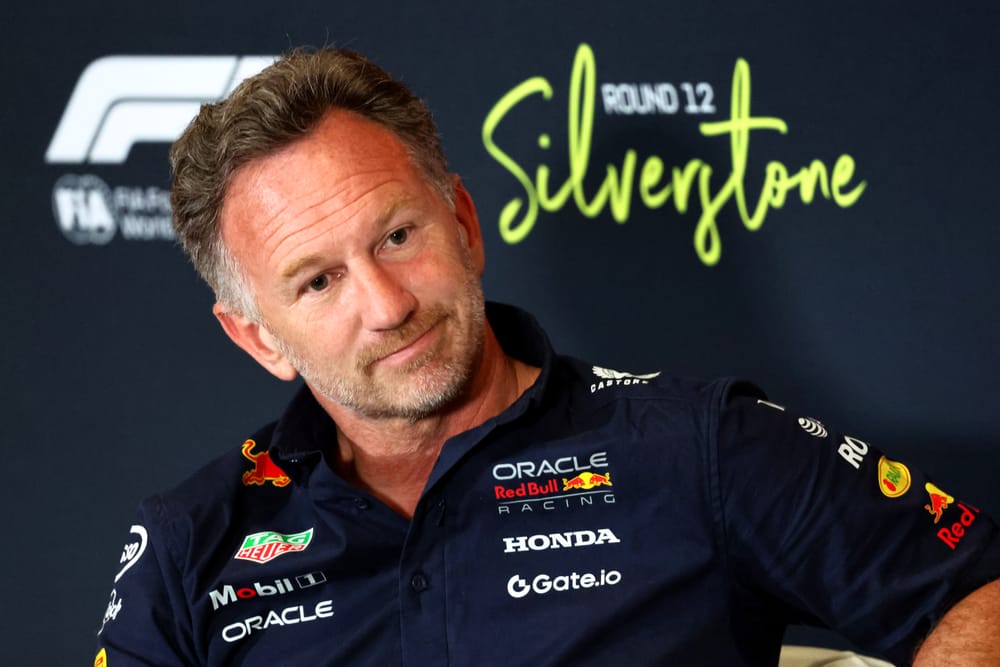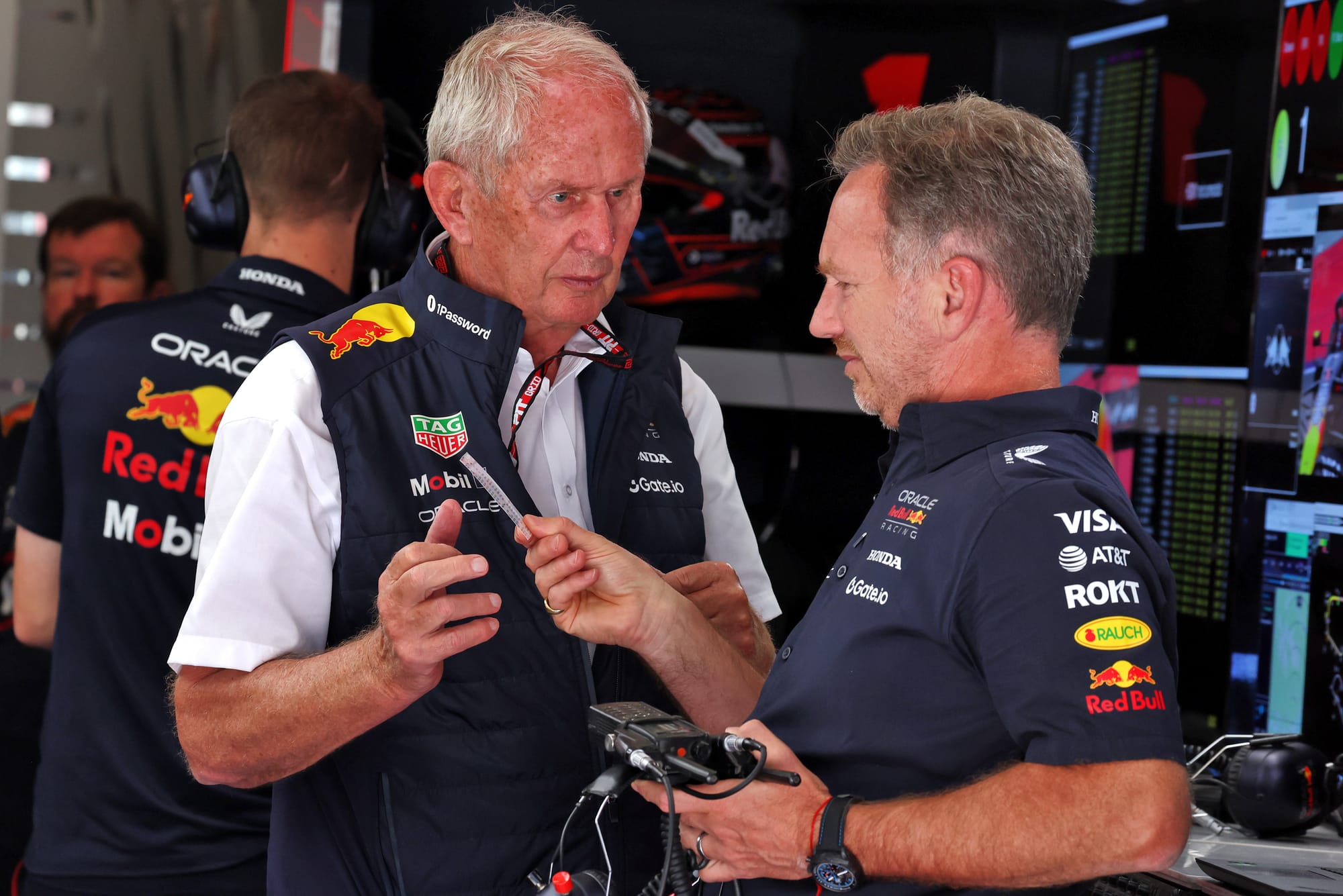The Fall of Christian Horner: What the End of an Era Means for Red Bull Racing
In a development that has sent shockwaves through the world of Formula 1, Red Bull Racing CEO and Team Principal Christian Horner has been removed from his dual roles at the team he helped build from the ground up. The decision, delivered unexpectedly as Horner addressed staff at the Red Bull factory, marks the end of an era that spanned nearly two decades and redefined what success looked like in modern F1.
This article explores the deeper reasons behind Horner’s removal, the shifting power dynamics within Red Bull Racing, and what it all means for the team’s future — particularly as it heads into its most ambitious chapter yet with the upcoming 2026 engine regulations.

Horner’s Legacy: From Bold Gamble to Dominant Force
When Dietrich Mateschitz founded Red Bull Racing in 2005 and appointed Christian Horner as its leader, the decision raised eyebrows. Horner, a relatively obscure figure at the time, had no experience managing an F1 team. Fast forward to 2024, and Red Bull under Horner’s stewardship had won six Constructors’ Championships and eight Drivers’ Championships, including two dominant periods — the Sebastian Vettel era (2010–2013) and the ongoing Max Verstappen era.
Statistically, Horner’s Red Bull is one of the most successful teams in Formula 1 history. His leadership created a winning culture defined by innovation, agility, and an unrelenting drive for performance. Horner was instrumental in recruiting engineering mastermind Adrian Newey and supporting talents like Jonathan Wheatley and Pierre Waché, all of whom contributed to the team’s rise.
Why Was Horner Really Removed?
Horner’s departure was not due to poor performance alone — though Red Bull’s dominance did appear to wane in 2024. At the heart of the decision was a struggle for control within Red Bull’s corporate structure.
Tensions escalated early in 2024 when Horner was accused of inappropriate behavior by a female employee. Although he was twice cleared through internal investigations, the damage to the team’s internal dynamics and public image was done. Screenshots of alleged messages circulated in the media, fueling speculation and widening the rift between Horner and senior figures within the team — most notably Jos Verstappen, Helmut Marko, and the Austrian board led by Oliver Mintzlaff.
Yet Horner had protection. The Thai majority shareholders, particularly Chalerm Yoovidhya, supported him, delaying any immediate ouster. But the fractures within the organization only grew deeper. Adrian Newey, the team’s technical wizard, left for Aston Martin. Jonathan Wheatley reportedly followed suit. The car — the RB20 — lost its edge, and McLaren began outperforming Red Bull on raw pace. Even Max Verstappen’s commitment to the team began to look uncertain.
It became evident: Horner was no longer tenable as team principal. But beyond the headlines, his sacking signaled a philosophical shift in how Red Bull would be governed.

The Power Shift: From Milton Keynes to Salzburg
The real catalyst behind Horner’s ouster is the shift in Red Bull’s leadership structure following Dietrich Mateschitz’s death in 2022. Under Mateschitz, Horner had near-complete autonomy. The Austrian billionaire trusted Horner to run the team with minimal interference.
However, Mateschitz’s passing changed everything. Control over Red Bull was consolidated under the Austrian board, headed by Oliver Mintzlaff. Unlike Mateschitz, Mintzlaff is more hands-on and favors centralized decision-making. Horner’s independent leadership style clashed with this new management ethos.
In recent months, the board’s desire for control became unmistakable. The sacking of two Horner allies — Oliver Hughes (CMCO) and Paul Smith (Director of Communications) — suggested a broader house-cleaning of Horner loyalists. The implication is clear: the Austrian board wants a tighter grip on all facets of the team, from technical decisions to public messaging.
This raises concerns that Red Bull Racing might follow the path of Ferrari, another team burdened by an overly involved board of directors.
A Ferrari-Like Decline?
Ferrari’s history offers a cautionary tale. Once the dominant team under Jean Todt and Michael Schumacher, Ferrari slipped into mediocrity after Todt’s departure in 2007. The cause? A bloated, micromanaging board that frequently undermined its team principals, creating an unstable environment for long-term success.
Red Bull under Horner resembled Ferrari in its glory years — a strong, centralized figure leading a tightly knit, high-performing group. Without Horner, Red Bull risks entering a phase of stagnation. Already, they’ve lost key staff and are struggling to adapt technically without Newey’s influence.
With the board now more involved in day-to-day operations, Laurent Mekies, the newly appointed team principal, will have far less freedom than Horner did. Mekies faces the challenge of running a historically independent team under corporate oversight — an uncomfortable mix that often breeds underperformance.
Verstappen’s Future: A Looming Domino
Perhaps the most critical short-term issue facing Red Bull is Max Verstappen’s future. Reports suggest that Mercedes is willing to activate a $100 million release clause to secure Verstappen’s signature. If Horner’s firing was the spark, the potential departure of Verstappen could be the explosion that dismantles Red Bull’s current structure altogether.
Verstappen has been Red Bull’s cornerstone since 2016 and their most potent weapon since 2021. His departure would leave a vacuum no reserve driver or outside hire can easily fill. Combined with the loss of Newey, the weakening of the technical team, and the power struggle in management, Verstappen’s exit could signal the beginning of a long decline.

What Lies Ahead?
Red Bull’s next big test will be 2026, when new engine regulations take effect. For the first time, the team will be developing its own power unit. This endeavor requires technical stability, strategic clarity, and a unified direction — all of which are now in jeopardy.
If the new management can balance corporate involvement with technical freedom, Red Bull might weather this storm. But if the board begins making sporting decisions to serve business interests, they risk undermining the performance culture Horner worked two decades to create.
Conclusion: The End of Red Bull as We Know It?
Christian Horner’s departure marks more than the end of an individual’s tenure — it may well mark the end of Red Bull Racing’s golden age. While it’s possible the team will continue to win races in the short term, their long-term future is far less certain.
Formula 1 history has shown time and again that too much boardroom interference often spells doom for even the most dominant teams. Without Horner, Newey, and potentially Verstappen, Red Bull must now rebuild — not just a car, but an entire identity.
For now, the world watches and waits: is this a transition toward a new era of innovation and success, or the beginning of a Ferrari-like fall from grace?
Full Video:





